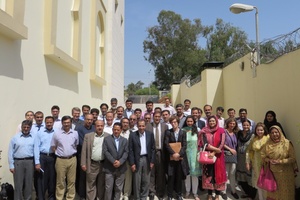Pakistan makes headway in TB care: 10 day joint monitoring mission to the country to help achieve the 2020 TB vision
6 June 2015 – Pakistan – The Government of Pakistan, along with the Stop TB Partnership, WHO and other technical and donor partners recently concluded a ten-day joint monitoring mission to review Pakistan’s National TB Control Programme.
The team headed by Dr Mohamed Abdel Aziz, WHO's Regional Adviser
for TB, visited four provinces and assessed the achievements,
challenges and opportunities of the TB programme in Pakistan.
For the first time in ten years, the review mission visited the
provinces of Balochistan and Khyber Pakhtunkhwa – the
team’s first visit to these provinces post-devolution,
giving the team members an insight into provincial TB
programmes.
The team focused its efforts on reviewing
Pakistan’s progress in the implementation of the National
Strategic Plan including following up on the recommendations of
the last mission held in November 2013. The monitoring team also
reviewed the country’s progress towards improving access
to TB care, challenges and plans for TB efforts and advising the
government and partners on the path towards strategies in line
with the set targets. The structure and function of disease
control within the framework of health services in country was
also examined, along with identifying opportunities for health
systems strengthening and recommending priority areas of
investment.
The mission recognized the substantial
progress made by the Pakistan TB programme, the great political
commitment of the government and the hard work of the National
TB Programme teams at both federal and provincial levels. The
mission suggested that the provision of TB at the primary
healthcare level should be strengthened by building upon the
services provided through the Basic Health Units and Rural
Health Centres. The review mission stressed the need for
continued engagement of the extensive network of private
providers by leveraging and expanding on the private sector
engagement initiatives. TB REACH led into supporting many
grantees to evaluate strategies to do this, including the
innovative approaches of Interactive Research & Development
(IRD) who have set up social enterprise models to screen for TB
in the private sector and subsidize testing. Other
recommendations focussed on mobilizing domestic resources at
both national and provincial levels, increasing political
commitment at provincial and district levels, improving TB
diagnosis in children, and increasing case finding through more
effective involvement of lady health workers.
Three
civil society and community representatives participated in the
mission to assess the engagement of civil society organizations,
TB affected community and the rights and gender issues affecting
the TB programme. These members met with various NGOs and civil
society organizations including the National Stop TB
Partnership. They suggested strengthening the role of community
health workers in the TB programme and appreciated the efforts
of the national Stop TB Partnership to engage parliamentarians
of the Sindh provincial assembly in the fight against TB. They
also recommended expanding this to other provinces.
“Pakistan’s
National TB Programme has successfully set up testing (with
Xpert) and treatment sites around the country, rapidly
increasing the number of drug-resistant TB patients started on
treatment, and with high treatment success. However MDR-TB is
already relatively common and may have pre-XDR, with strains
resistant also to the MDR drug Ofloxacin which makes it
difficult to treat,” said Mr Einar Heldal from the
Norwegian Institute of Public Health following a review of the
Programmatic Management of Drug-Resistant TB sites.
“It
is very promising that the National TB Programme has
strengthened its collaboration with the private sector. Laws on
mandatory notification and stopping over-the-counter sale of TB
drugs are in process which should reduce practices in the
private sector which may lead to drug-resistant TB,” he
added.
During the mission, drug management experts
from the Stop TB Partnership’s Global Drug Facility (GDF)
worked with the National TB Programme to further strengthen the
support that GDF can provide to Pakistan’s TB
programme. For GDF colleagues, the joint mission
underlined the importance for the National TB Programme to
ensure that locally produced anti-TB medicines in the country
are in line with international standards with regards to
quality. The existence of an agency in the country that can
obtain WHO accreditation as a quality control laboratory to
perform bioequivalence testing could also ease the process of
getting more local medicines pre-qualified by WHO.
Source:
Stop TB Partnership


